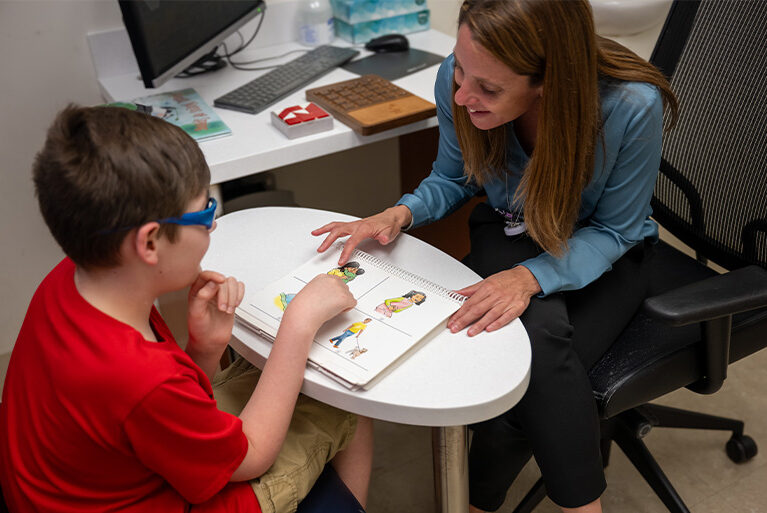
Having a child diagnosed with epilepsy presents challenges for any family. Medication calibration, seizure control, and worries about the short and long-term impact of seizures are all weighty and time-consuming. When coupled with an autism diagnosis, these families don’t always know where to turn or how to prioritize their child’s needs.
That’s why Erika Axeen, MD, and Katheryn Frazier, MD, developed the Clinic for Autism and Pediatric Epilepsy (CAPE) at UVA Health Children’s. Axeen, an epileptologist, and Frazier, a developmental pediatrician, see patients at the same appointment and collaborate on a treatment plan in real time. Laurie Brenner, PhD, a pediatric neuropsychologist, contributes to the clinic as well.
Autism & Epilepsy
Though the connection is not well understood, autism and epilepsy are frequently seen in the same patients. Seizures are the most common neurological complication of autism. “It presents a unique sort of problem,” Frazier says. “Both seizures and the treatment for them can significantly impact behavior, learning, and development.”
Epilepsy and autism can also mimic each other, with many behaviors occurring with both conditions. Are new staring spells uncontrolled seizures, ADHD, or sensory overload? Are sleep disruptions due to seizures, a side effect of medication, or an autism symptom? This creates difficulty with diagnosis and can also create challenges for evaluating a treatment plan’s success.
Anti-seizure medications are lifesaving and a valuable part of a treatment plan. But in many cases, medications can cause behavioral or mood disturbances. They present additional unique challenges for autistic patients. Parents worry when their child is not able to articulate side effects and mood changes.
Even with medication, 1 in 3 children with epilepsy will still experience seizures. These patients often require multiple medications, creating concerns about the effects of polypharmacy. In addition to medication, other options for treatment include:
- Vagal nerve stimulation
- Dietary therapy
- Epilepsy surgery
These treatment options each come with their own pros and cons. These are examined as a team and discussed with families.
Multidisciplinary Problem-Solving in Real-Time
Sometimes, seizure improvement leads to behavior improvements, which is ideal. But it’s not always that straightforward. “There have been times where a medication change caused a significant improvement in seizure,” Frazier says. “Then the family noticed more problematic behaviors. But we were able to think about it collaboratively with the family to consider all the possibilities and options. Then make another medication change based on that family’s priorities. It definitely reduces the time it would have taken us to work through that.”
Having a neuropsychologist is a crucial part of this process. Brenner’s evaluation helps Axeen and Frazier understand how a child’s brain is developing, their unique strengths and weaknesses, and how various medical factors may be affecting them. Repeating neuropsychological evaluation at different developmental stages creates a picture of change over time. This makes it easier to make the best possible decisions about treatment.
Partnering with Families
The appeal of the clinic for patients and families is obvious. Instead of going home with one piece of a puzzle, families go home with a treatment plan. They don’t have to wonder if their child’s seizure medication will derail their autism progress, because their neuropsychologist and developmental pediatrician were already consulted. Concerns can be addressed before treatment is started. Families get a full picture of their child’s needs and progress.
And many patients have seen progress. Four years after the clinic’s official kick-off, many patients have seen significant seizure reduction. Some are even now living seizure-free. Axeen adds, “we’ve had parents describe the impact of the seizures on their family life as all-consuming. But now that the seizures are better, we can really focus on other symptoms.” Helping improve the child and family’s quality of life is always the goal.
Frazier and Axeen adapt their strategy in response to each family’s individual concerns and treatment objectives. Axeen says part of the clinic’s strength is that they’re “able to make those on-the-fly decisions about what's more important to the family today. Is it their seizures? Or is it this mood symptom? And we can adapt our care.”
The clinic’s premise itself helps patients realize it’s going to be a different experience. “They’ll say I have another appointment; I’m not sure where to go. And I tell them no, you stay here,” Axeen explains. “And then Dr. Frazier is there.” Instead of asking families to navigate a large hospital and worry about appointment times, they stay in one room and receive multidisciplinary care that’s comprehensive and that extends past their medical concerns.
Comprehensive Care
Ultimately, for these families, it’s not about getting care for their child’s autism and their epilepsy. They want their child to be cared for. To have their needs understood and met. And to believe that they’re on the path to better.
Sometimes that doesn’t mean talking about symptoms. It means talking about support.
Neuropsychologists can offer testing to patients across the spectrum. “Many of these parents have been told their child is untestable,” Brenner says. “But here, we can provide that testing. For some families, a more accurate diagnosis is the difference between receiving services and not.” Making sure their patients can access the community supports that are available for them is a key part of care. And through a large children’s hospital, clinical social workers can help patients navigate paperwork.
As their patients get older, they’re also making sure their families have conversations about guardianship and transition of care for children who will need ongoing medical support and advocacy after their 18th birthday.
“Obviously, these children need care for both their epilepsy and autism, but it's pretty rare to have this in a single collaborative visit,” Axeen says. In the region, it presents a unique offering, only possible because of the broad range of specialties available at UVA Health Children’s.